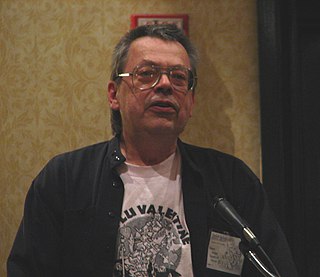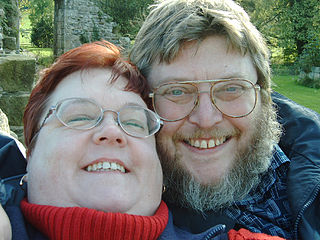The Down Under Fan Fund, also known as DUFF, was created in 1970 for the purpose of providing funds to bring well-known and popular members of science fiction fandom familiar to fans on both sides of the Pacific Ocean.
The Down Under Fan Fund, also known as DUFF, was created in 1970 for the purpose of providing funds to bring well-known and popular members of science fiction fandom familiar to fans on both sides of the Pacific Ocean.
DUFF was created by John Foyster in 1970 as a means of increasing the face-to-face communication between science fiction fans in Australia and New Zealand, and North America. It coincides with the push within Australian fandom to host the World Science Fiction Convention in Australia in 1975, (Aussiecon), and the rise of fanzine fandom centred on Melbourne, Australia; e.g. Australian SF Review, SF Commentary, ANZAPA . He based the procedures of DUFF on the already-existing Trans-Atlantic Fan Fund (TAFF), which began in 1952.
DUFF is funded through the support of fandom. Candidates are voted on by interested fans all over the world, and each vote is accompanied by a donation of not less than $US5 or A$6. These donations, and the continued generosity of fandom, are what make the whole concept of these fan funds possible.
In addition to donations, fans hold auctions at science fiction conventions to raise money for DUFF. Frequently art, books, T-shirts, and other ephemera of fandom are auctioned off for this purpose.
Each candidate posts a bond, promising to travel (if elected) to a major convention on the other side of the Pacific; and has provided signed nominations and a platform.
Voting is by secret ballot, using instant-runoff voting; and is open to anyone who has been active in fandom for the prior year or more and who contributes to the Fund. Ballots are signed, to prevent ballot-box stuffing and to enable the election administrators to identify each voter as a known member of fandom.
Although the winner is expected to attend Worldcon or a specific national convention, DUFF delegates generally also tour the country before and/or after the convention in order to meet a variety of fans.
Winning DUFF candidates are expected to write a trip report, which customarily takes the form of a fanzine or a series of fanzine articles. These fanzines are sometimes sold in order to help raise funds towards future DUFF trips. In addition, winners take over the administration of the fund for their region (Australia/NZ or North America) for two years until the next regional DUFF delegate is selected. At any given time, there are at least two administrators, one for each region.
Past DUFF winners by year. [1] Westbound races (ex-US) are marked << and eastbound (ex-Australasia) >>.

Science fiction fandom or SF fandom is a community or fandom of people interested in science fiction in contact with one another based upon that interest. SF fandom has a life of its own, but not much in the way of formal organization.

Science fiction conventions are gatherings of fans of the speculative fiction genre, science fiction. Historically, science fiction conventions had focused primarily on literature, but the purview of many extends to such other avenues of expression as films, television, comics, animation, and games. The format can vary but will tend to have a few similar features such as a guest of honour, discussion panels, readings and large special events such as opening/closing ceremonies and some form of party or entertainment. Science fiction conventions started off primarily in the UK and US but have now spread further and several countries have their own individual conventions as well as playing host to rotating international conventions.
File 770 is a long-running science fiction fanzine, newszine, and blog site published and administered by Mike Glyer. It has been published every year since 1978, and has won a record eight Hugo Awards for Best Fanzine, with the first win in 1984 and the latest in 2018.
Walter Alexander Willis (1919–1999) was a well-known Irish science fiction fan, resident in Belfast.

Stephen Willis Stiles was an American cartoonist and writer, coming out of the science fiction fanzine tradition. He won the 2016 Hugo Award for Best Fan Artist.
The Trans-Atlantic Fan Fund, often known as TAFF, is a crowdfunding project created in 1953 for the purpose of providing funds to bring well-known and popular members of science fiction fandom familiar to fans on both sides of the ocean, across the Atlantic.
Kevin Smith was an active British science fiction fan from the mid-1970s to the mid-1980s, producing such science fiction fanzines as Drilkjis and Dot, writing for fanzines, chairing British science fiction conventions, editing a 1979 anthology of British fanwriting titled Mood 70 for Seacon '79, the 37th World Science Fiction Convention, and serving from 1980 to 1982 as editor of Vector, the critical journal of the British Science Fiction Association. He won the TransAtlantic Fan Fund in 1982.
Martin Tudor is an active British science fiction fan, editor or co-editor of several science fiction fanzines, and a member of various convention committees, most notably Novacon. He ran the fan programme at the 1987 worldcon in Brighton. In addition, during the early 1990s, he freelanced as a book reviewer for the magazine publisher Pegasus.
The 70th World Science Fiction Convention (Worldcon), also known as Chicon 7, was held on 30 August–3 September 2012 at the Hyatt Regency Chicago in Chicago, Illinois, United States.
The Melbourne Science Fiction Club Inc. was founded in May 1952 by Race Mathews and others. It is the second oldest continuously active science fiction club in the world, after the Los Angeles Science Fantasy Society. It meets once a month in Melbourne.
Aubrey Vincent Clarke (1922–1998), often known as Vin¢ Clarke, was a well-known British science fiction fan.
The 28th World Science Fiction Convention (Worldcon), also known as Heicon '70, was held on 20–24 August 1970 at the Stadthalle Heidelberg in Heidelberg, West Germany.
Greg Pickersgill, is a British science fiction fan.
Don Ford (1921–1965) was an influential American science fiction fan from Ohio.
Arthur Thomson (1927–1990) was a British artist and writer, a highly regarded member of British science fiction fandom from the 1950s onwards, both as a fanzine writer/editor and prolific artist. Resident illustrator for the influential fanzine Hyphen, he won the TransAtlantic Fan Fund in 1964 and visited the United States. Thomson was nominated five times for the Hugo Award for Best Fan Artist, but never won.
Sue Mason is a British illustrator of science fiction fanzines and other works. She has won two Hugo Awards.

Steve Green is a former newspaper reporter (1978–84) turned freelance journalist, who has also written short fiction and poetry. He is an active member of the science fiction press and fan community.

Richard H. E. Smith II is a Chicago, Illinois- and Milwaukee, Wisconsin-based software engineer, computer consultant and a science fiction fanzine publisher.
The Ditmar Award has been awarded annually since 1969 at the Australian National Science Fiction Convention to recognise achievement in Australian science fiction and science fiction fandom. The award is similar to the Hugo Award but on a national rather than international scale.
Jeanne Gomoll is an American artist, writer, editor, and science fiction fan, who was recognized as one of the guests of honor at the 72nd World Science Fiction Convention, having been a guest of honor at numerous previous science fiction conventions. She has been nominated multiple times for awards in artist and fanzine categories, and for service to the genre of science fiction, particularly feminist science fiction.